Sam Cooke - Trouble Blues (RCA 8803)
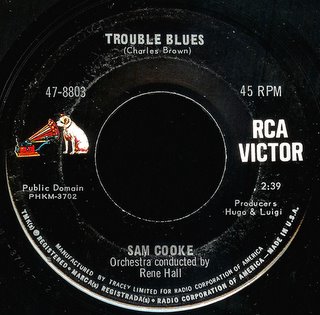
Trouble Blues
Sam Cooke's influence runs so deep through the heart of this music that I hardly know where to begin.
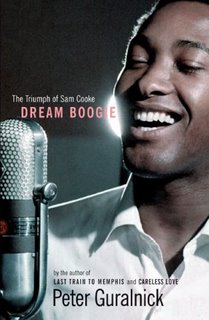 First off let me say that, if you haven't done so already, you owe it to yourself to read Peter Guralnick's Dream Boogie: The Triumph Of Sam Cooke. This incredibly in-depth biography captures so much history between its covers, man. From the beginnings of modern Gospel music in post-war Chicago to Cosimo's studio in New Orleans... from Little Richard, Jesse Belvin, and Jackie Wilson to Sammy Davis Jr., Harry Belafonte, and Nat King Cole, this book just blows me away!
First off let me say that, if you haven't done so already, you owe it to yourself to read Peter Guralnick's Dream Boogie: The Triumph Of Sam Cooke. This incredibly in-depth biography captures so much history between its covers, man. From the beginnings of modern Gospel music in post-war Chicago to Cosimo's studio in New Orleans... from Little Richard, Jesse Belvin, and Jackie Wilson to Sammy Davis Jr., Harry Belafonte, and Nat King Cole, this book just blows me away!The story of Sam Cooke is the story of Black America's struggle for Civil Rights... of a remarkable man whose belief in himself and his own talent went on to open doors and provide opportunities never before dreamed possible in Jim Crow's America.
Born in Clarksdale (!), Mississippi in 1931, Sam was raised in Chicago in the very bosom of Gospel music. He was singing with his brothers and sisters in his father's Church by the time he was six years old. He would go on to lead The Highway QC's as a teenager, and was recruited to replace the renowned R.H. Harris as lead vocalist for the legendary Soul Stirrers before he turned twenty years old.
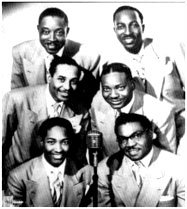 He was to become arguably the most popular singer in all of Gospel, regularly tearin' down the house wherever The Stirrers performed. His boyish charm and good looks kept him a favorite with the ladies, and it was said that he "brought sex into the church".
He was to become arguably the most popular singer in all of Gospel, regularly tearin' down the house wherever The Stirrers performed. His boyish charm and good looks kept him a favorite with the ladies, and it was said that he "brought sex into the church".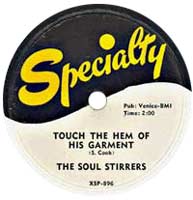
Sam's tremendous songwriting skills were already apparent during his Gospel days. He could pick up a Bible and write another best seller for Specialty Records seemingly at will. He couldn't help but notice the success that people like Ray Charles were having by bringing "church" into their R&B hits and, with the encouragement of Specialty producer Bumps (Tutti Frutti) Blackwell, he decided to "go pop".
Specialty wanted no part of this, and so Sam signed with the upstart Keen label who released his self-penned (although still attributed to his brother L.C. for contractual reasons) You Send Me in 1957. The record went straight to number one on the pop charts, and established Cooke as a bona-fide crossover phenomenon with appearances on The Ed Sullivan Show and everything!
 He would become partners with former Pilgrim Traveler J.W. Alexander in his own publishing company, and they would go on to form their own record label, SAR, in 1959 in order to "record people we like". Never one to turn his back on his past, Sam's first release on the new label was The Soul Stirrers' Stand By Me Father with Johnnie Taylor (doing his best Sam Cooke imitation) now handling the lead vocal spot.
He would become partners with former Pilgrim Traveler J.W. Alexander in his own publishing company, and they would go on to form their own record label, SAR, in 1959 in order to "record people we like". Never one to turn his back on his past, Sam's first release on the new label was The Soul Stirrers' Stand By Me Father with Johnnie Taylor (doing his best Sam Cooke imitation) now handling the lead vocal spot.In 1960, Sam signed with "lilly-white" RCA records where he would be produced by pop mavens Hugo & Luigi, two cousins hired by the label to crank out the hits. While their production style sometimes got in the way, they would keep him charting consistently for the company. They also were smart enough to know when to get out of the way.
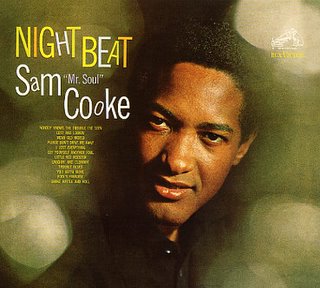 Such was the case with the 1963 album Night Beat, considered by many to be Cooke's finest hour. It was recorded over the course of a weekend with a small combo that included jazz legend Barney Kessel along with the indispensable Clif White on guitar, Hal Blaine on the drums, and a 16 year old named Billy Preston on the Hammond organ. As we mentioned a couple of weeks ago, the album relies heavily on Charles Brown's material and may have been conceived as a kind of payback for Bring It On Home To Me.
Such was the case with the 1963 album Night Beat, considered by many to be Cooke's finest hour. It was recorded over the course of a weekend with a small combo that included jazz legend Barney Kessel along with the indispensable Clif White on guitar, Hal Blaine on the drums, and a 16 year old named Billy Preston on the Hammond organ. As we mentioned a couple of weeks ago, the album relies heavily on Charles Brown's material and may have been conceived as a kind of payback for Bring It On Home To Me. RCA would release Little Red Rooster as the single from the album in October of 1963 but, although it climbed as high as #11 on the pop charts, it doesn't really reflect how great an album this really is. Today's B side (used as the flip of the forgettable Let's Go Steady Again) is more like it. Sam's smoky take on Brown's smooth California brand of the blues is just priceless... I love this record, man!
RCA would release Little Red Rooster as the single from the album in October of 1963 but, although it climbed as high as #11 on the pop charts, it doesn't really reflect how great an album this really is. Today's B side (used as the flip of the forgettable Let's Go Steady Again) is more like it. Sam's smoky take on Brown's smooth California brand of the blues is just priceless... I love this record, man! Meanwhile, "civil unrest" was spreading throughout America. The horrific treatment Sam had endured as a black entertainer touring the South had given him first hand experience with what was going on. He had become friends with people like Cassius Clay (actually producing a record on him for SAR) and Malcom X. Martin Luther King Jr.'s movement resonated in his soul. When he heard "white boy" Bob Dylan's Blowin' In The Wind he knew he "had to write something". The resultant A Change Is Gonna Come may well be one of the greatest records ever made.
Meanwhile, "civil unrest" was spreading throughout America. The horrific treatment Sam had endured as a black entertainer touring the South had given him first hand experience with what was going on. He had become friends with people like Cassius Clay (actually producing a record on him for SAR) and Malcom X. Martin Luther King Jr.'s movement resonated in his soul. When he heard "white boy" Bob Dylan's Blowin' In The Wind he knew he "had to write something". The resultant A Change Is Gonna Come may well be one of the greatest records ever made.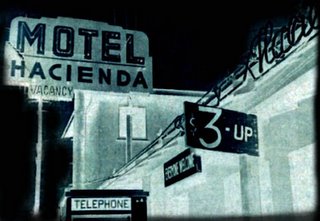 On December 11, 1964 Sam Cooke was shot dead by the night manager of the Hacienda Motel in Los Angeles.
On December 11, 1964 Sam Cooke was shot dead by the night manager of the Hacienda Motel in Los Angeles.An edited version of A Change Is Gonna Come was released as the B side of Shake 11 days later... can you imagine?
People still mourn him.


















7 Comments:
Absolutely wonderful write-up. Thank you!
Great write up, although reading so much makes my eyes hurt, its well worth it, especially while listening to the mans work. I just wish it would have gone into more detail at the end. Why did the manager kill him? Did he do time for it? What was Sam doing there?
THAT, my friend, is the proverbial $64,000 question... the manager (a she) was let off the hook after the killing was ruled a "justifiable homicide"... for an incredibly detailed account of what happened that fateful night, please visit Clark Kaufffman's excellent site (sure to make the ol' eyes hurt even more!).
Thanks for the feedback!
oh~
wow~
I love this man ^^
Can you share more his hits?
thanks
azul de hong kong
Detailed or not how can anyone KNOW about the killing when there were no witnesses other than a woman who was probably a liar.
We'll have to wait for some death bed confession same as the Brian Jones episode
Its all hearsay
i LOVE sam.
great voice, charming persona.
tops.
thanks for reminding us that again.
touch the hem of his garment may be the best gospel song ever.
The second best song on the album in my opinion, which only proves how great it is, since number one for me is Lost and Lookin' which might be my ultimately favorite song ever. Love your blog, greetings from Holland.
Jos Z.
Post a Comment
<< Home